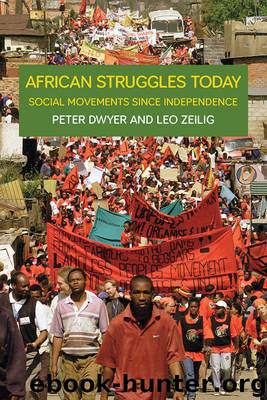African Struggles Today: Social Movements Since Independence by Peter Dwyer & Leo Zeilig

Author:Peter Dwyer & Leo Zeilig [Dwyer, Peter & Zeilig, Leo]
Language: eng
Format: epub
Publisher: Haymarket Books
Published: 2012-10-25T07:00:00+00:00
The politics of participation in the 2000s
While the 1990s were characterized by a general unwillingness among new democratic governments to engage with social movements, the first decade of the new century saw a significant change in relations between African states, civil society, and international donors. The new emphasis on participatory decision-making was a liberal response to decades of criticism that top-down economic liberalization, in the specific form of SAPs, had failed in large part because it did not enable popular ownership of and participation in creating such programs. The new mechanisms introduced, particularly the PRSPs, were linked to the Highly Indebted Poor Countries (HIPC) program. This meant that many sub-Saharan African countries were required to complete the conditions of a national PRSP before they qualified for the substantial debt relief promised by multilateral and bilateral donors in response to the Jubilee debt campaigns carried out in the run-up to the millennium. Tanzania signed its PRSP in 2001; Malawi and Zambia adopted theirs in 2002.56
The extent to which civil society is able to wield meaningful influence over PRSPs is pitiful. Many observers, including among more radical social movements, see them as a fig leaf for neoliberal programs which are local and participatory only in a tokenistic manner.57 Most PRSPs contain requirements for further economic liberalization and, in particular, the privatization of remaining state assets. The emphasis in the new participatory model on locally owned and country-specific approaches to poverty reduction nevertheless made it incumbent on participating governments to engage more closely with civil society. This coincided, in both Zambia and Malawi, with the election of governments apparently committed to opening up such a dialogue. In Zambia, the election of Levy Mwanawasa as Chiluba’s successor (following the successful campaign against the latter’s third term) brought to power a new MMD president who was comparatively liberal in his approach. A lawyer by training, Mwanawasa unexpectedly initiated a process which led to his predecessor Chiluba having his immunity from prosecution removed and being charged with crimes of corruption. CSOs welcomed these measures, which vindicated their stance in the “third term” campaign. Similarly, Bingu wa Mutharika was elected as Malawian president in 2004; endorsed as the UDF candidate by Muluzi, Mutharika subsequently broke from the UDF to form his own Democratic Progressive Party (DPP). Mutharika, like Mwanawasa, was less directly confrontational in his dealings with civil society than his predecessor. Lacking a parliamentary majority, Mutharika’s government sought to engage civil society officials in the decision-making process, though primarily to utilize their technical expertise rather than their political analysis. Mutharika, an economist by training, was initially strongly wedded to neoliberal economic orthodoxy, while emphasizing transparency in fiscal matters.58 While some organizations, particularly those active in the global anticapitalist movement, advocated a boycott of any process involving the IFIs, the vast majority of CSOs in the countries under study saw participation in PRSPs as an opportunity, not a threat.59
A major limitation on effective participation was the complex, policy-oriented nature of the process. “Participation,” for the donor bureaucracy,
Download
This site does not store any files on its server. We only index and link to content provided by other sites. Please contact the content providers to delete copyright contents if any and email us, we'll remove relevant links or contents immediately.
| Arms Control | Diplomacy |
| Security | Trades & Tariffs |
| Treaties | African |
| Asian | Australian & Oceanian |
| Canadian | Caribbean & Latin American |
| European | Middle Eastern |
| Russian & Former Soviet Union |
The Secret History by Donna Tartt(19052)
The Social Justice Warrior Handbook by Lisa De Pasquale(12187)
Thirteen Reasons Why by Jay Asher(8893)
This Is How You Lose Her by Junot Diaz(6877)
Weapons of Math Destruction by Cathy O'Neil(6264)
Zero to One by Peter Thiel(5786)
Beartown by Fredrik Backman(5737)
The Myth of the Strong Leader by Archie Brown(5499)
The Fire Next Time by James Baldwin(5431)
How Democracies Die by Steven Levitsky & Daniel Ziblatt(5215)
Promise Me, Dad by Joe Biden(5141)
Stone's Rules by Roger Stone(5081)
A Higher Loyalty: Truth, Lies, and Leadership by James Comey(4954)
100 Deadly Skills by Clint Emerson(4921)
Rise and Kill First by Ronen Bergman(4779)
Secrecy World by Jake Bernstein(4741)
The David Icke Guide to the Global Conspiracy (and how to end it) by David Icke(4706)
The Farm by Tom Rob Smith(4502)
The Doomsday Machine by Daniel Ellsberg(4484)
